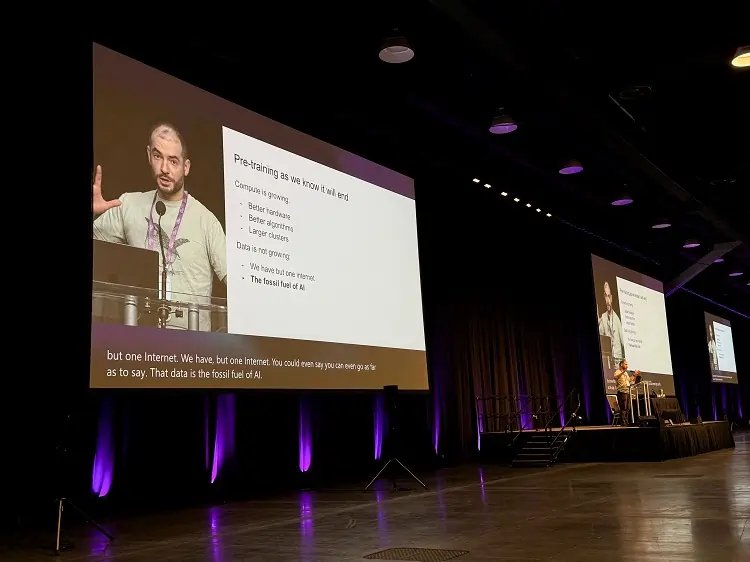When AI vies with Taylor Swift as the hot ticket in town


By Jeffrey Dastin, Kenrick Cai and Anna Tong
VANCOUVER (Reuters) – Deep in the cavernous convention center here, on math-filled posters or in spirited conversations, could be a breakthrough for artificial intelligence in the making.
More than 16,000 computer scientists and fellow travelers gathered in British Columbia over the past week for what has become AI’s biggest annual event: NeurIPS, or the Conference on Neural Information Processing Systems.
Long toiling in obscurity, AI’s brightest minds have convened at the event since 1987, for years in Denver, then in Vancouver and other cities. More recently these researchers have emerged as industry sensations helping drive the future of technology and the global economy.
Rock stars of the field told their budding compatriots, packed into an exhibition hall last week, how they saw the future of AI. “The more it reasons, the more unpredictable it becomes,” said Ilya Sutskever, until recently OpenAI’s chief scientist.
“The new ladder to climb,” said Stanford’s Fei-Fei Li, “is the 3D ladder, which I call spatial intelligence.” She said relying on 2D data from the internet was like building AI for a “flat earth.”
The conference is nothing like the intimate affair it was decades ago, when a field of outliers could fit into a hotel bar. It has become fertile ground for corporations to tout their wares and draw academics into newly lucrative business. Meta Platforms CEO Mark Zuckerberg showed up in 2013, attendees recalled.
This year, major companies Alphabet, Meta and Microsoft timed AI news to the event. The crowds were so massive that NeurIPS began a day later than usual, so AI scientists would not fight for hotel rooms the same night as a Taylor Swift concert.
By Friday, with two days of events still ahead, the men’s restroom near a principal entrance had three of four urinals broken, covered in plastic from apparent overuse.
Conference old-timers such as AI “godfather” Yann LeCun reflected on a bygone era. Several hundred academics, almost all familiar faces, used to display posters on topics like Bayesian statistics and debate them at a Vancouver Hyatt late into the night, attendees remembered.
LeCun, Meta’s chief AI scientist, remarked to reporters that he no longer could peruse these posters that have been a mainstay. He would be stopped by requests for a selfie at every step.
Money has transformed that quaint era. Venture capitalists and other investors descended on the academic affair, with some firms such as NEA and Greylock hosting after parties for the first time.
Where there were nine sponsors of the 2006 conference, this year garnered over 120, the NeurIPS website showed. A new “diamond” tier appeared in 2022, the year that some attendees pegged as the euphoria peak. OpenAI launched ChatGPT during those conference dates.
At the booth of diamond sponsor Google DeepMind, chief scientist Jeff Dean thanked attendees for listening to him through “weird headphones” connected to a microphone so he could reach them despite exhibition hall noise.
Ten times more research papers were accepted at this year’s conference compared to a decade ago. David Ha, co-founder of startup Sakana AI, said he saw a huge uptick in new schemes for test-time compute to counteract exorbitant costs and technical snags as models scale up to become ever larger.
Microsoft Research’s Hanna Wallach said improving AI evaluations and measurement science was in greater focus this year. One winning paper proposed an AI model that predicts images at higher resolutions iteratively. China’s ByteDance, the parent company of TikTok, has reportedly sued that paper’s co-author, its former intern.
A 10-year-old, Harini Shravan, was the youngest person ever to have a paper accepted at NeurIPS. She attended from India, with her parents, and used AI tools to fashion a 3,000-year-old tale into a musical.
And Dean said at a crowded event on the sidelines that AI “models should be much more modular, and sparse, and kind of twisty and tangly than the current model architectures.”
That, he said, was his “spicy” view.
(Reporting by Jeffrey Dastin, Anna Tong and Kenrick Cai in Vancouver, Editing by Kenneth Li and Nick Zieminski)
Artificial Intelligence (AI) refers to the simulation of human intelligence in machines programmed to think and learn like humans. It encompasses various technologies, including machine learning and natural language processing.
A research paper is a detailed document that presents the results of original research or an analysis of existing research. It typically includes methodology, findings, and conclusions.
Venture capital is a type of private equity financing that provides funds to startups and small businesses with long-term growth potential. Investors receive equity in return for their investment.
Spatial intelligence is the ability to visualize and manipulate spatial relationships and understand how objects relate to one another in space. It is crucial for tasks involving navigation and design.
A conference is a formal meeting where researchers present their findings, share ideas, and discuss advancements in their field. It often includes presentations, workshops, and networking opportunities.
Explore more articles in the Technology category











